
AI in Sales: The Trend & 7 Ways to Empower Sales Teams
Record, transcribe and summarize conversations with one click.
The application of artificial intelligence in sales is a controversial topic in the sales industry. While some stakeholders are opposed to its use because they think it is ineffective or harmful, others consider it valuable and have found effective ways to adopt it in their sales process.
The only way to resolve this debate is to look at the evidence.
According to an HBR study, organizations that pioneered the use of AI in sales:
increased the number of leads and appointments they received by up to 50%
cut overall costs by 40 - 60%
reduced call time by up to 70%.
So, are you ready to join the winning team?
If yes, keep reading to find out how to leverage AI to empower your team and the AI tools for sales you need.
What is artificial intelligence in sales?
AI in sales is simply the application of artificial intelligence to optimize various aspects of the sales process.
It involves using advanced algorithms to automate repetitive tasks, generate actionable insights for sales teams through data processing, and make predictions. When combined with human expertise, AI can significantly boost sales performance.
So, why exactly is AI necessary in sales?
There are four main reasons:
Increased efficiency: AI can assist sales professionals by reducing their workload. And while AI takes on low-value, time-consuming, and repetitive tasks, sales professionals can focus on high-value activities and boost productivity.
Improved sales analytics: AI algorithms can analyze large amounts of sales data quickly and identify trends and patterns to help sales teams gain deeper insights.
Enhanced customer service: AI’s ability to understand or predict customers’ needs by simply observing and analyzing their behavior allows sales teams to serve their customers better. Knowing customers’ specific needs allows salespeople to tailor their solutions and deliver great service.
Competitive advantage: By leveraging AI in sales, companies will gain a competitive edge with all the benefits AI can offer. It is estimated that 75% of B2B companies will leverage AI to augment sales by 2025.
Will AI replace salespeople?
With the rise of AI, there has been a nagging question: will AI replace salespeople?
The answer is no. Artificial intelligence is not there to replace sales professionals.
While AI has an undeniable potential to efficiently execute parts of the sales process, it fails in aspects where more human characteristics, such as emotional intelligence, complex decision-making, rapport-building, and creative problem-solving, are required.
Therefore, AI cannot handle the high-value interactions and strategic decision-making that salespeople can - and these are often required in most sales scenarios.
That said, it is important to see AI as what it is - a valuable tool that complements and empowers salespeople, rather than as their replacement. The human element and expertise that salespeople provide will continue to play a pivotal role in sales success. So, don’t be afraid of AI and take advantage of its many benefits!
7 ways your sales team can leverage AI
Now that we have addressed the elephant in the room and established that AI is not the enemy, we will look at seven ways your team can leverage AI to optimize the sales process and stay competitive.
1. Conversation intelligence
In sales, conversational intelligence uses machine learning and natural language processing to analyze and extract valuable information from customer calls and meetings. It has several use cases in sales.
For one, AI transcribes sales conversations to text and conducts a keyword analysis to spot customers’ interests and pain points, making it easier to determine how to approach subsequent conversations and curate offers that convert.
AI takes it even further by analyzing the tone of the conversation and providing a decent assessment of customers’ satisfaction and sentiments. How did they feel about the sales pitch? What points are they skeptical about? What part of our offer landed well with the customer? You can get intelligence reports answering these questions in a matter of minutes!
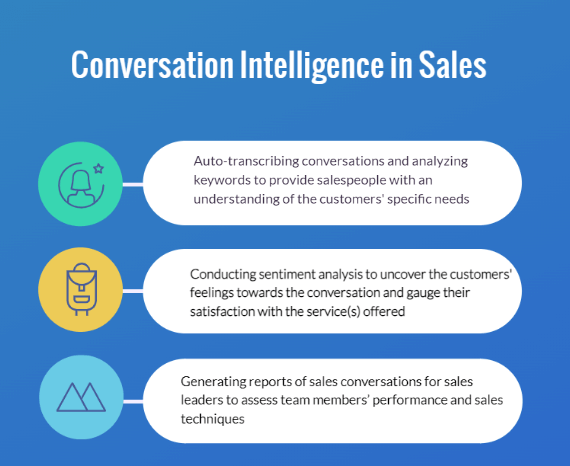
The sales lead can also use AI-generated reports of sales conversations to assess team members’ performance in calls and get a much better look into the sales techniques adopted by your team members without having to listen to the entire conversation.
But even cooler, you can learn the talk-to-listen ratio, conversation length, or specific actions taken during the interaction. These analytics provide insights into the engagement levels and effectiveness of the sales conversation.
2. Lead scoring and pipeline management
“Sales teams can attain predictably better results by leveraging one of the tools on the marketplace that allows users to capitalize on artificial intelligence to better prioritize leads. The better the list of leads your team is working off of, the more successful it will be as your salespeople can invest their time selling to the prospects most likely to buy.” - Adam Mendler, The Veloz Group
Identifying high-quality leads will help your team channel their efforts to leads with the highest potential, and thus, maximize efficiency and conversion rates. Many sales reps rely on their intuition, but this is not always accurate. The closest you can get to an accurate and insight-driven answer is through AI.
AI’s machine learning algorithms can analyze customers’ demographic information and interaction with your sales platform and marketing content to determine their likelihood of conversion, and assign scores. A higher score indicates a place further down the funnel and that a lead has a bigger buying intent.
You can also leverage AI to organize and efficiently manage your sales pipeline from lead generation to closing. While any decent sales rep can handle a few sales leads and prospects, AI can manage large volumes of leads and prospects without difficulty. This empowers your team to:
Track the progress and status of each deal
Easily spot blockers or bottlenecks in the sales cycle
Understand the reason behind the success or failure of deals
Measure and improve sales approach and performance
3. Optimize sales engagement
Relationships are fundamental to successful sales and customer retention. And to build and maintain solid relationships with customers and leads, reps must effectively engage them.
With the right AI tool, you can enhance your sales engagement and generate more conversions in the following ways:
Automating customer interactions. AI uses natural language processing and machine learning to understand the sentiment expressed in a text and generate responses based on how it has been preprogrammed.
A great example of how this is used is AI chatbots and virtual assistants that handle routine customer inquiries and FAQs, and provide 24/7 support.
Identifying and reaching out to leads. AI can identify and reach out to leads on digital platforms, such as websites and social media, by sending emails, prompting demo requests, or scheduling calls.
Content optimization. You can introduce AI to your email campaigns to improve open, click-through, and conversion rates. How? AI can help you develop email campaigns that are tailored specifically to the needs and preferences of your potential customer by customizing the offer, subject line, and send time!
What’s more? AI can help avoid repeating the same mistakes by using data from previous email campaigns to determine the best approach for subsequent campaigns. This introduces dynamism and adaptability to your sales engagement approach.
4. Sales analytics
If you want unbiased and objective reports of key sales metrics, AI is the way to go. AI sales analytics software gathers and processes sales data to measure sales performance and these are, in turn, applied to help you make the right decision.
The main point of sales analytics is interpreting sales data, such as CTA click-through rates, purchasing habits, conversion rates, and customer feedback, to understand sales trends, performance, areas of improvement, and opportunities.
There are four main sales analytics categories that AI monitors:
Diagnostic analytics probes into data to understand why something happened.
Descriptive analytics track your team’s historical sales data against present data so that you can determine what is currently happening.
Prescriptive analytics seek the most appropriate solution or line of action based on the data accessed and information provided.
Predictive analytics uses previous data and insights to determine what will happen in the future.
The ultimate selling point of sales analytics is that they help you develop a data-driven sales strategy and figure out the best way to use your team or company’s resources.
5. Sales forecasting
AI has been found to reduce forecast error from 32% to 0% and is, therefore, considered the most accurate and effective forecasting method.
Sales forecasting is vital for any sales team. However, manual forecasting might not always be 100% accurate because even the most skilled sales analyst might sometimes make mistakes when analyzing vast amounts of data or trying to make inferences from large data sets. Manual forecasting is also time-consuming.
AI, on the other hand, can produce quick and reliable forecasts. It uses data science to analyze vast amounts of historical sales data and generate bias-free reports on the company’s current and projected sales. This makes future planning and decision-making with realistic expectations possible.
AI can also make recommendations on how to achieve best-case scenario outcomes or navigate undesirable outcomes.
While AI can be relied on to provide accurate forecasts, it is important that you feed the software with complete and relevant data. You should also ensure that you train and frequently test your AI models, which help guarantee continuous improvement and performance optimization.
6. Service personalization
“More and more brands are harnessing the power of AI to implement tailored product recommendations, and are seeing results. It’s estimated that 35% of Amazon’s sales come from its recommended products feature.” - Meghann York, Product Marketer, Salesforce
According to Salesforce’s State of Sales report, the top use case for AI in sales is to help reps understand customer needs. The reason for this is pretty clear - knowing what your customer needs is at the heart of how to effectively engage them and curate offers that are suited to their pain points.
So, how does AI do this?
AI algorithms analyze customers’ purchase history, behavior, and preferences to make personalized recommendations. This increases the customers’ likelihood of making a purchase and enhances the customer’s experience and satisfaction. Personalization can take various forms including:
Product recommendation. AI can tailor product recommendations to customers’ specific needs. This also presents an opportunity for upselling and cross-selling. So, even when prospects or customers already have an intended purchase, AI can invite them to make a higher-end or complementary purchase.
Content personalization: AI can generate highly personalized sales pitches and proposals for customers while saving sales reps productive hours and ensuring that every proposal is engaging and on the nose.
Dynamic pricing: AI can set the ideal price for a product and suggest optimal prices for individual clients.
7. Process automation
McKinsey estimates that up to 30% of sales tasks can be automated using current sales technology, including artificial intelligence. In effect, AI can give your team more time to focus on more important work.
Some key ways you can leverage AI’s process automation in sales, including:
Lead identification and qualification. AI can automatically identify and qualify leads based on their behavior on your website and the items they show interest in. It can also automatically follow up on leads once a purchase intention has been established.
Order management: AI can be used to automate order-related services, such as credit checking, invoicing, and issuing receipts.
Repetitive tasks. Mundane and repetitive tasks such as extracting data from documents, updating databases, scheduling meetings, language translation, inventory management, sales call or meeting summaries, and transcribing text to speech can be done by AI.
Mailbox management. AI can filter through your mailbox to categorize and prioritize incoming emails according to the content or sender, making it easy to efficiently manage.
AI automation also accelerates sales processes, shortens sales cycles, and improves overall sales performance.
4 useful AI tools for sales
There is a wide array of AI tools you can choose from to improve your team’s sales. We’ve, however, made a list of the three most important ones you absolutely need.
Notta AI meeting assistant
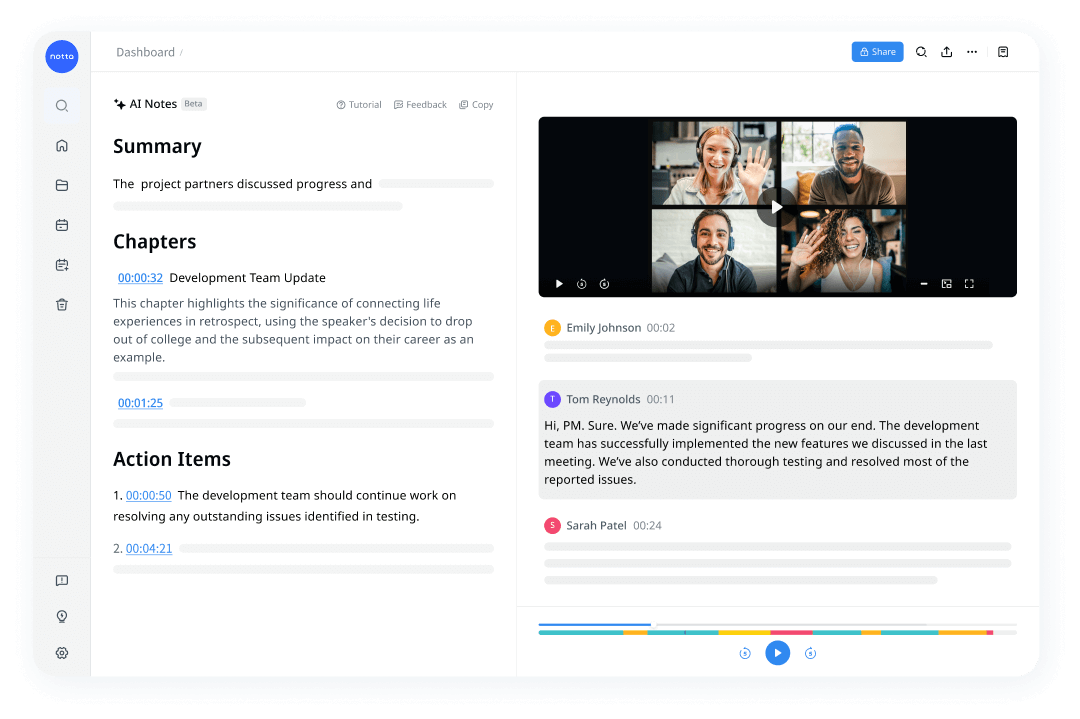
Notta is an AI meeting note taker for sales and CSM who have a lot of meetings with clients and struggle to retain the information.
Three key features of Notta that make it an asset to every sales team are:
1. Recording and transcribing sales calls: Notta records and transcribes sales calls and meetings - virtual and in-person - to allow salespersons to focus on the conversations rather than taking notes.
The recordings and notes provide an accurate representation of all that was discussed during a call and can be used as points of reference for future follow-up. Sales managers can also use the recordings and notes to evaluate team members’ performance and as material for sales coaching.
2. AI summary: Notta can generate meeting and call summaries that provide a comprehensive view of the conversation for your review or reference. So, instead of spending several minutes or hours to understand what happened in a sales meeting, managers and team members can get a quick recap.
3. CRM integration: Its integration with Salesforce also makes it safe and accurate to import notes, links, and customer data in one click.
Notta offers the most integrated AI meeting notes, summaries, and action items so nothing gets missed.
HubSpot Sales Hub
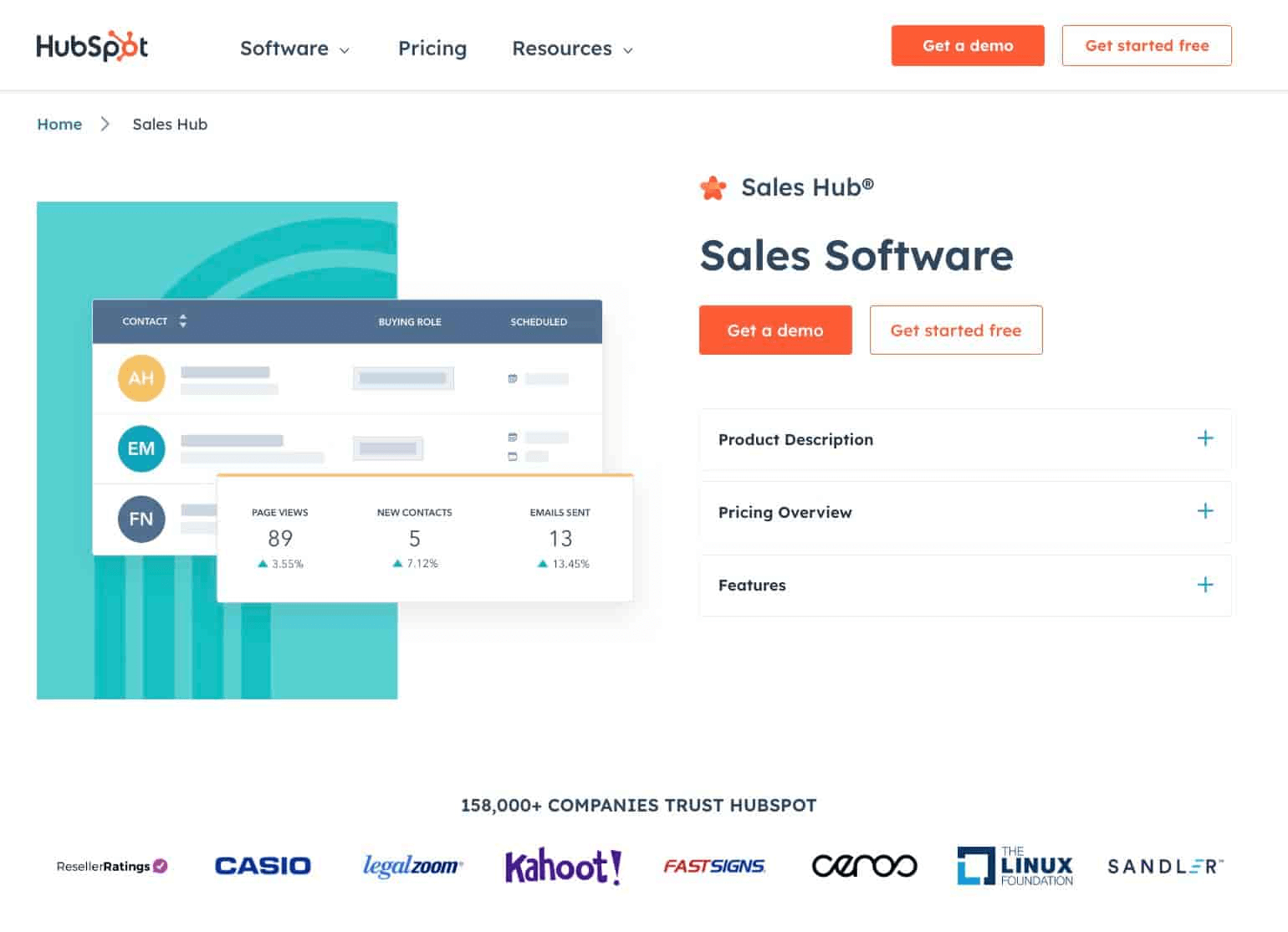
While HubSpot Sales Hub functions primarily as a CRM, it has an impressive inbuilt sales analytics feature that is perfect for monitoring sales metrics and creating sales reports.
Sales Hub uses AI to gather data from prospects and customers, including mobile business cards, email conversations, and the company website and then uploads them into the CRM software for processing. The results are presented in customizable dashboards that provide an at-a-glance look into various sales reports.
Sales Hub also helps automate sales engagement by tracking emails and calls. This allows users to know when exactly an email is opened and automatically logs details of a sales call in the CRM. This AI-powered automotive technology also simplifies setting up and sending automated follow-up emails and CTAs to prospects and customers.
Salesforce CRM
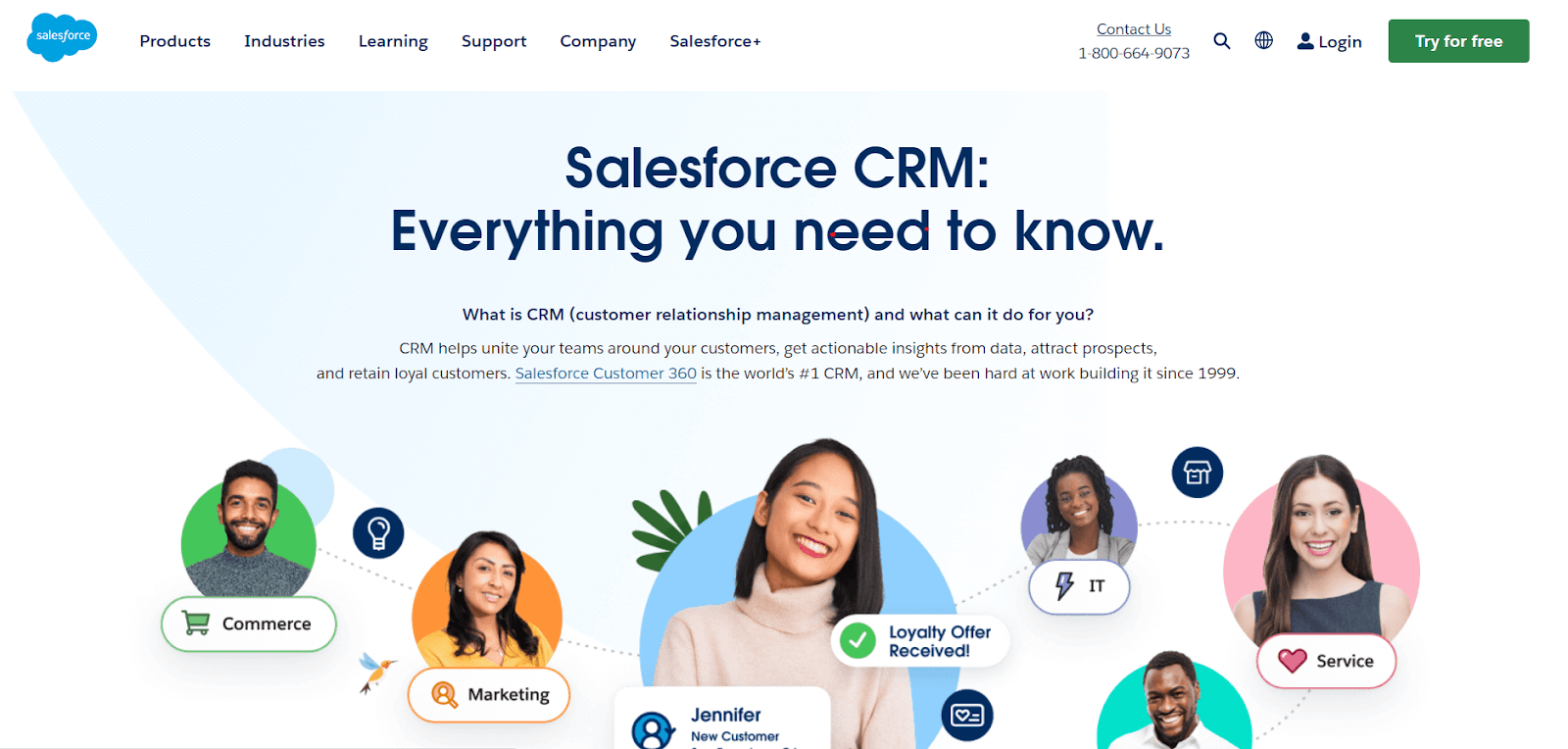
Salesforce is a comprehensive CRM tool packed with features you need to manage your customers and sales process from start to finish.
Following the trends, Salesforce also introduces AI into its system and uses it for:
Industry solutions: Salesforce offers experiences and solutions tailored to a team or salesperson’s industry. This empowers salespersons to function like industry experts and offer highly-specialized and personalized experiences to their customers.
Contact management: Salesforce automates various repetitive and low-value aspects of managing sales contacts. For example, it can automatically record customer and prospect details and track their interactions with your business.
Reporting and analytics: Its AI algorithms can unify and analyze data to generate reports, insights, and forecasts in real time!
RingCentral’s RingSense for Sales
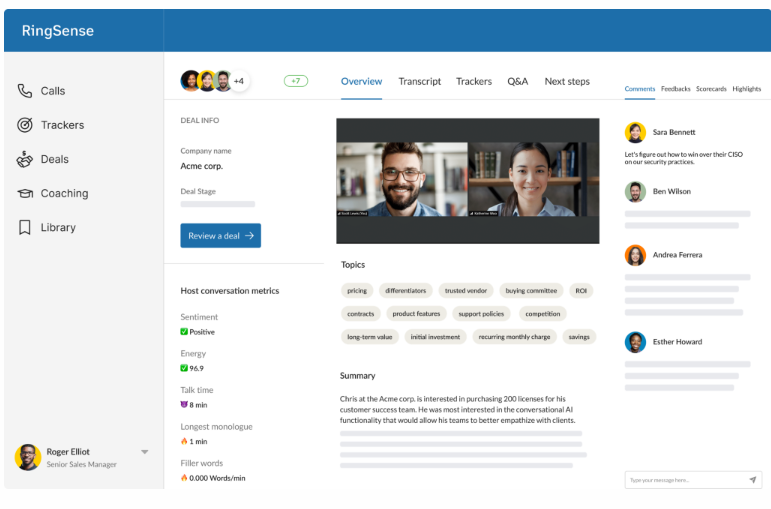
A leader in cloud communications, RingCentral has designed a conversational AI for sales software to help you unearth the value trapped in your communications gold mine–unstructured data inside your conversations. You can tame communication chaos and empower your sales team to automate operations, accelerate pipelines, and ultimately, crush quotas.
Let RingCentral help you find your next big win beyond search and sort, and unlock new insights for your entire revenue organization.
Here’s how RingSense for Sales can work for your key revenue players:
Automation for sales agents: the software can seamlessly integrate with your existing business apps-–from Salesforce, Hubspot, Microsoft Dynamics, and other CRMs to keep prospect or customer opportunities accurate and up to date. Let AI instantly update your CRM records with summaries and action items so you can focus on closing.
AI-generated summary scoring for revenue leaders: Interaction-level scoring and reporting help managers prioritize conversations that need the most attention without manually sifting through conversations. This feature can help track improved win rates by pinpointing exactly what impacts deal progression to deliver exceptional onboarding and coaching.
Integrated reporting for sales enablement team: Identify key moments and create playbooks with real customer voices generated from personalized performance tracking reports. Enablement can uncover customer insights to help improve playbook adoption, decrease ramp time, and standardize coaching.
Alerts for the customer success teams: Setting up alerts for call filters or playlist updates such as upsell motions they need to be aware of. Teams can be proactive, shorten prep time for account reviews, follow up faster, and ultimately improve the customer experience.
Level up!
57% of high-performing sales organizations are using AI tools to improve processes and customer experiences, compared to 20% of underperforming teams. In effect, high-performing teams are 2.8 times more likely to use AI than underperforming teams.
The facts speak for themselves. AI is becoming increasingly indispensable to high-performing teams and helping to improve customer engagement and sales. And this trend is likely to continue in the future so, here’s your cue to level up by leveraging AI sales tools.